The political aspect of multiplayer formats is a completely different skill than two player Magic tests, and for me, it’s one of the most interesting parts. I grew up playing multiplayer games with a group of friends who were very into the political side of things, and recently I’ve been playing a lot of cEDH, so I wanted to discuss one of the core concepts behind politics in Commander, which is the role of public information.
To me, the most foundational aspect of multiplayer politics is the question of who’s going to answer a threat. For the most part, any time any player answers a threat, it hurts them and it hurts the player whose threat is being answered, and it helps the other players at the table. Because of this, you never want to be the player to answer something. However, if you never answer anything, sometimes you’ll lose to something you couldn’t answer. Also, sometimes there’s something that is only threatening you, and then no one else will answer it for you, so you have to be able to answer it.
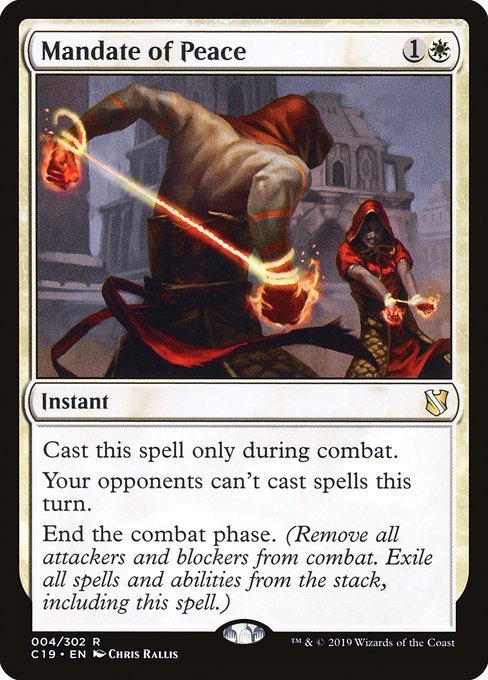
If answering anything is always bad, you could theoretically not play any cards that answer anything and only play threats. While it’s technically possible to win this way, you give up a lot of control in the game, and I don’t think it’s ultimately a very good strategy.
Instead, you have to be judicious with your answers. I try to only answer anything if I absolutely have to.
One great tool that’s available to preserve your answers is to threaten to use them without actually using them. If you have a removal spell you can play at instant speed, you could kill a creature that might attack you, or you could reveal the fact that you have a removal spell and suggest that if that creature attacks another player and not you, you won’t use the removal spell, because you’d like the other player to take damage. If the controller of the creature takes you up on that you’ve saved yourself life and functionally dealt damage to another player without needing to use your card.
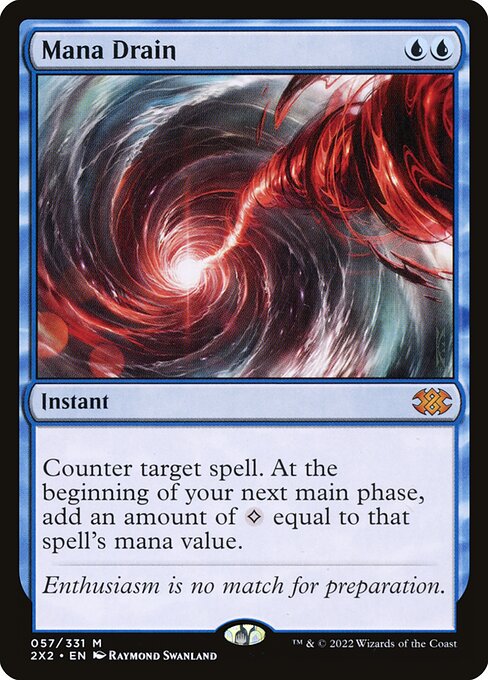
There’s a cost to revealing information, which is that now the rest of the table knows that you have it. The biggest problem with the rest of the table knowing that you have an answer is that now if someone plays something that has to be answered, no one else will use a removal spell because they know that you can, and you don’t know that they can, so you’ll have to answer it.
The same principle can apply to counterspells.
One of my favorite tactics is to reveal a counterspell to a player who has started down a path that would be foiled by the counterspell, like if they played a Dark Ritual, I’d show them a counterspell and tell them that they shouldn’t bother playing whatever spell they were trying to get the mana for because it’ll get countered. Sometimes this works (it won’t always work, but you can read the context of the board to figure out how likely the player is to back down when threatened), but again, there’s a cost that when it does work, the next time something absolutely has to be answered, you’re going to be on the hook to answer it.
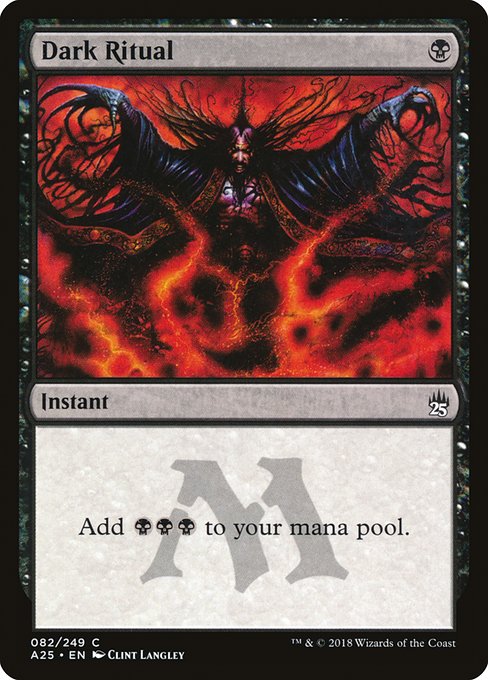
Technically, there’s a bit of a game of chicken here. If you’re confident someone else has an answer, you can simply refuse to use your card even if it’s revealed. Sometimes there’s something the rest of the table thinks has to be answered but you don’t think it does, and then you can pass and see if someone else wants to answer it. Other times, maybe there’s a card that’s deterministically going to win the game, and in this spot, you have to act because everyone else knows you have the counter, so they won’t act. You can still refuse here, and risk losing the game to try to force someone else to act, but here, understanding priority becomes important.
If a player casts a spell that says “win the game,” the player to their left gets priority, if they pass, the next player gets priority, and if they pass, the last player gets priority. If that last player passes, the spell resolves and the game ends. However, any action will reset priority, and that can even be tapping a land. Ultimately, if you’re the last player and you have no action to take, the game will end if you don’t act. In that spot, I’d personally recommend acting. In any other spot, you can pass if you believe the next player can and will use an answer if forced.
This leads to a question about how hard you should play chicken in these spots.
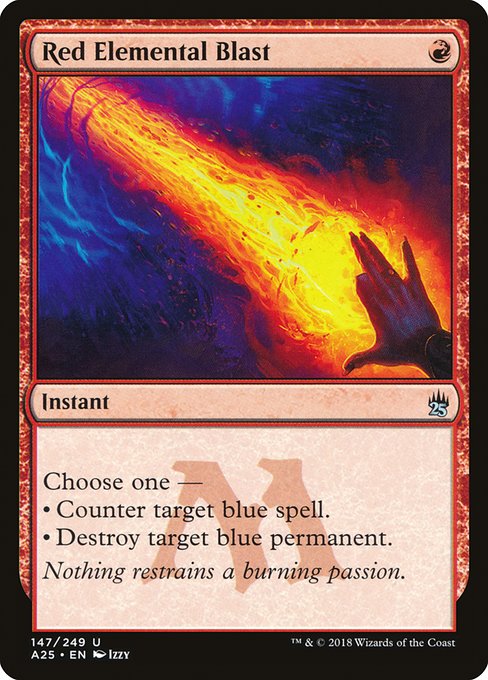
For me, the first thing I think about is how much equity I believe I have at that moment. If I believe I have very little equity, I’m going to make someone with a lot of equity use an answer–they have the most to lose, so they’re most incentivized to do so, and I’m probably pretty sure they have an answer, as it’s likely the reason I think they have a lot of equity is that they have a lot of cards.
Another thing to consider is that your options aren’t just to act or pass, you can also talk.
You could say, for example, “you know I have a counterspell, and I could use it, but I think you have a counterspell, so I’m going to pass priority. The only circumstance in which I won’t pass priority is if you reveal your entire hand and you don’t have a counterspell. If you do that, I’ll use my counterspell.” Players are often very resistant to showing information, and someone might think you’re bluffing, so they might not agree even if they have a counterspell, but there might be times when that player believes you won’t use your counterspell unless they show, or they happen to not have anything they think is valuable to hide, so you could get some information here in exchange for your counterspell.
You might notice that it would be easy to overlook the option to use such a sentence. In regular games of Magic, the only options are how you play your cards, but in multiplayer games, there are an infinite number of additional actions available to you that are how you use words.
Somewhat awkwardly, there’s no fixed cost to using words and making offers, threats, requests, etc. In timed rounds, such as at most tournaments, the cost is the amount of time the conversation takes, but that isn’t specifically a cost you pay, as it takes time away from the whole table. In general, the more time the table spends talking, the more likely the game is to end in a draw, which is typically bad for the table, so players are collectively encouraged to minimize conversation to maximize the chance of ending a game, but unfortunately, on an individual level, it’s easy to find things you can say that probably increase your equity as the chance that they help you is a good rate for you for the increased chance that the game ends in a draw because of the time the conversation took.
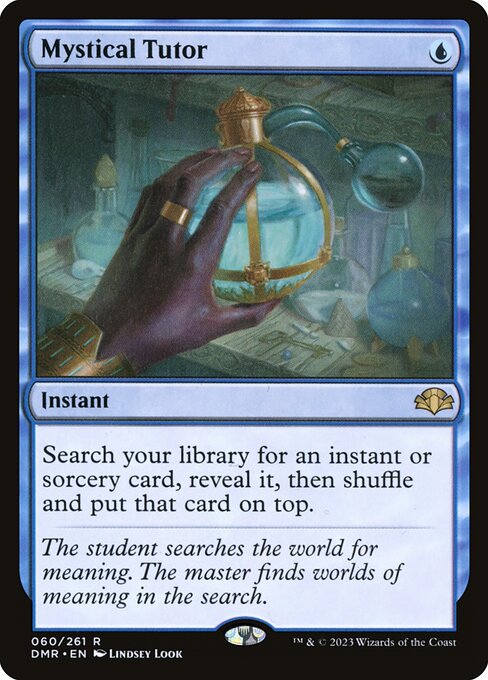
In addition to cards being revealed intentionally by a player, there are other ways cards can become known, or at least inferred. Of course, some cards are revealed by the game rules, such as if a player draws after resolving Mystical Tutor, but more commonly, information can be gleaned from tells. One of the most obvious and relevant is when a player thinks for a while before passing priority. Commander games can get long, and whether you’re just playing for fun or playing in a tournament, there’s a lot of pressure to try not to slow the game down. That means that if a player casts a spell, people will usually pass immediately if they can’t do anything. If you can and you ask for time to think, if you then can’t do anything, everyone else can be pretty sure you at least have an instant of some sort. Because revealing that you have an answer generally increases the chance that you’ll have to use that answer, it’s typically pretty valuable to avoid giving away that information. For that reason, you want to have a pretty good plan for which kinds of spells you intend to interact with and which you don’t so that you know if you’re going to respond before priority gets to you.
Another valuable kind of information that players often try to obtain is, “what is your intention with that card?” some cards don’t have a target when they’re put on the stack. A common example would be something like a Manglehorn, which will destroy an artifact when it enters the battlefield. If there are multiple artifacts that it looks like you might want to destroy, a player might ask which you plan to destroy before letting it resolve. Sometimes it can be good to tell them, such as if you think they might counter it if you’re going to destroy their artifact and might let it resolve if you’re not and you weren’t planning to destroy their artifact. Other times you might not answer. Sometimes it’s less clear, for example, sometimes a player might ask what you’re intending to do with a tutor effect, where you’re more likely to want to hide that information.
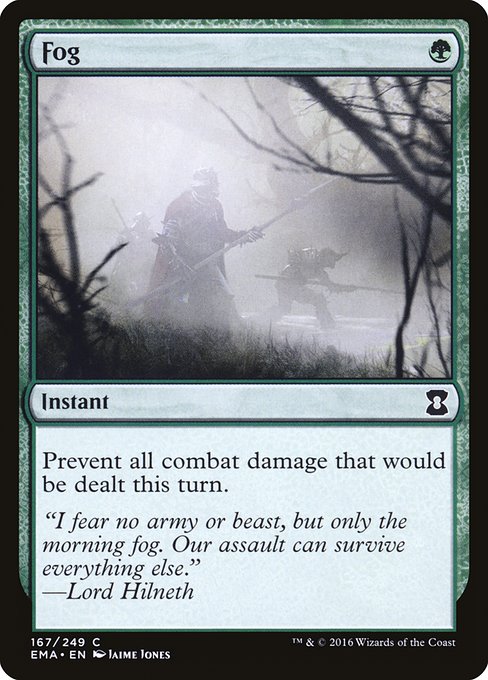
You might consider that you can just lie when a player asks your intent. It’s true that you can do that, but I don’t recommend it. When you lie you basically remove yourself from most political action for the rest of the game at a minimum, but also might lead the player you lied to or maybe even other players to take actions against you out of spite. Additionally, it becomes considerably less likely that any player at that table will trust you in future games, and might even lead to other players outside the game hearing about it and not trusting you in future games. The politics of honesty and when to break your word in Commander, where it is legal to break your word are interesting, deep, and complex. Personally, I treat individual games of Magic as instances of a longer iterated game that is all the games of Magic I will play, and I think the benefit I could get for dishonesty isn’t worth the long term cost, but I know other players who would always break their word if the outcome of a game directly hinges on it, and I even still might trust some of those players in situations where I think the outcome of a game is unlikely to directly hinge on the thing we’re discussing.
Regardless of where you fall on when you think lying is worth it, I think it’s strategically optimal to avoid in low stakes situations, so I’d generally recommend refusing to answer a request for information about your upcoming actions rather than lying about them.
With that said, there have been times when I’ve intentionally misled people about my intentions. If I can make the table assume I’m playing a card that will have a much smaller impact than it actually will, I’ll certainly try to do that to increase the chances that it happens, like if I’m removing a stax piece that will let me combo, but might also allow my to take some other not particularly relevant action, I might point out that I’d like to be able to take the less relevant action to hope that the table doesn’t realize that it also opens the door for me to go for a win.
Note that that misdirection hinges on providing information, it’s just information that’s somewhat misleading, but again, a lot of political action in Commander revolves around information.
Ultimately, you want to try to pay close attention to what each player at the table knows and how additional information could modify their future actions. Often the most important thing you can do is make sure that all players are aware of everything they should be aware of, such as making sure a player is familiar with how another one of your opponents’ decks works such that they can identify when they need to interact in case they have a card that would let them interact at the right time that you don’t know about. If you’re looking to improve your political game, I think information is a great thing to focus on.
Sam Black (any) is a former professional Magic player, longtime Magic writer, host of the Drafting Archetypes podcast, and Twitch streamer. Sam is also a Commander Cube enthusiast, and you can find Sam’s cube list here. For anything else, find Sam on Twitter: @SamuelHBlack.

